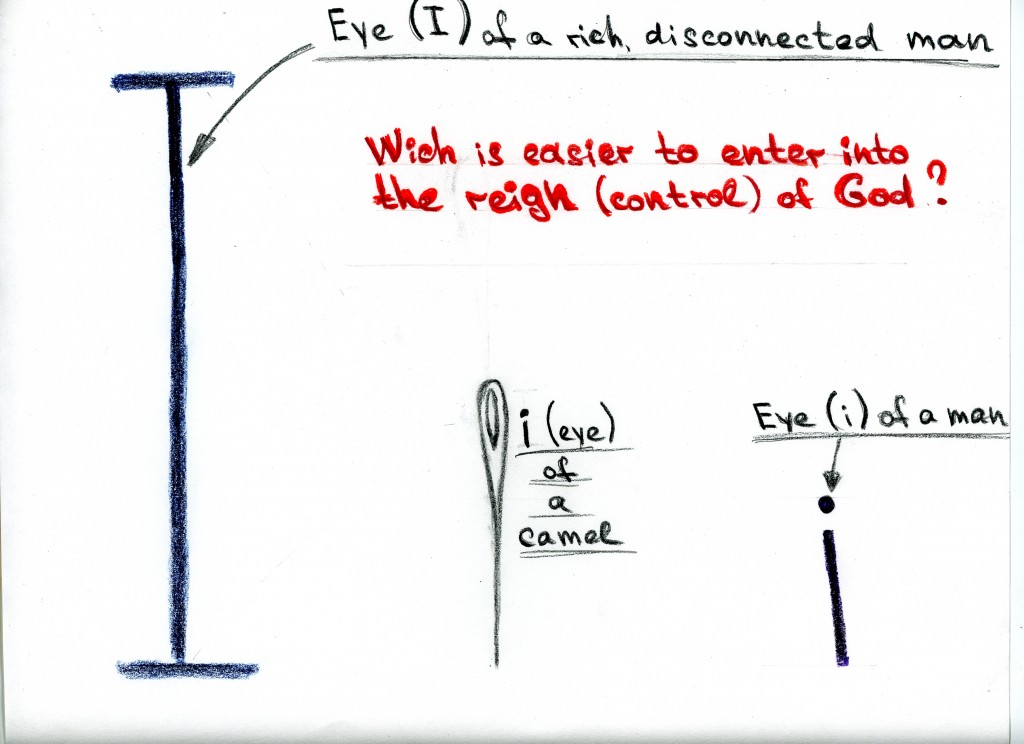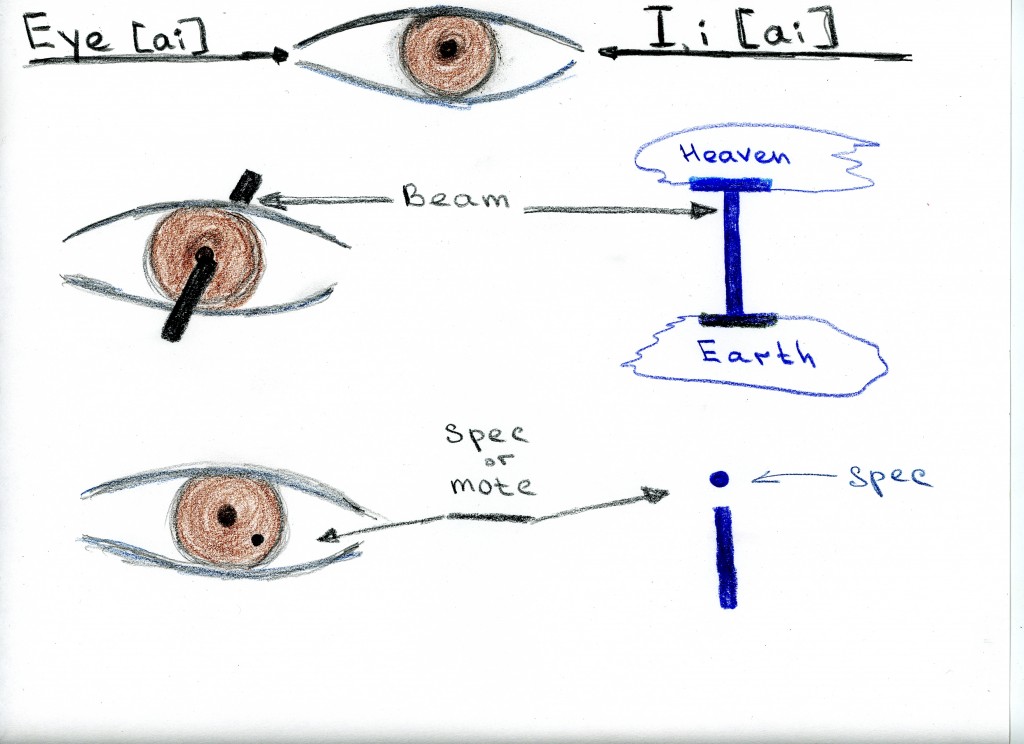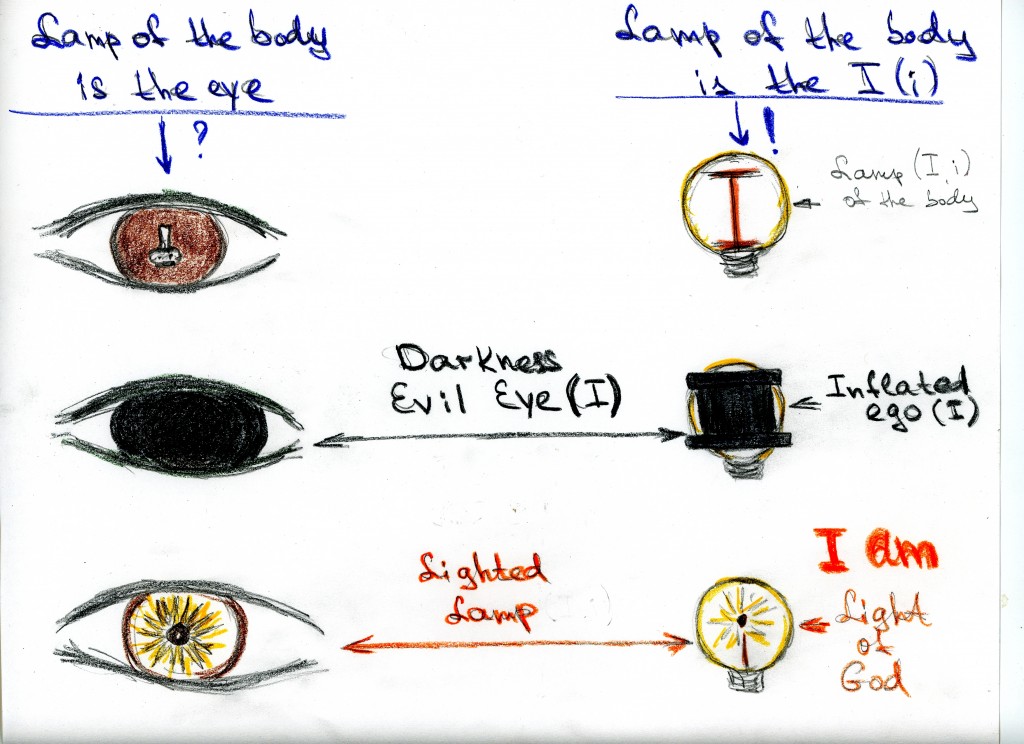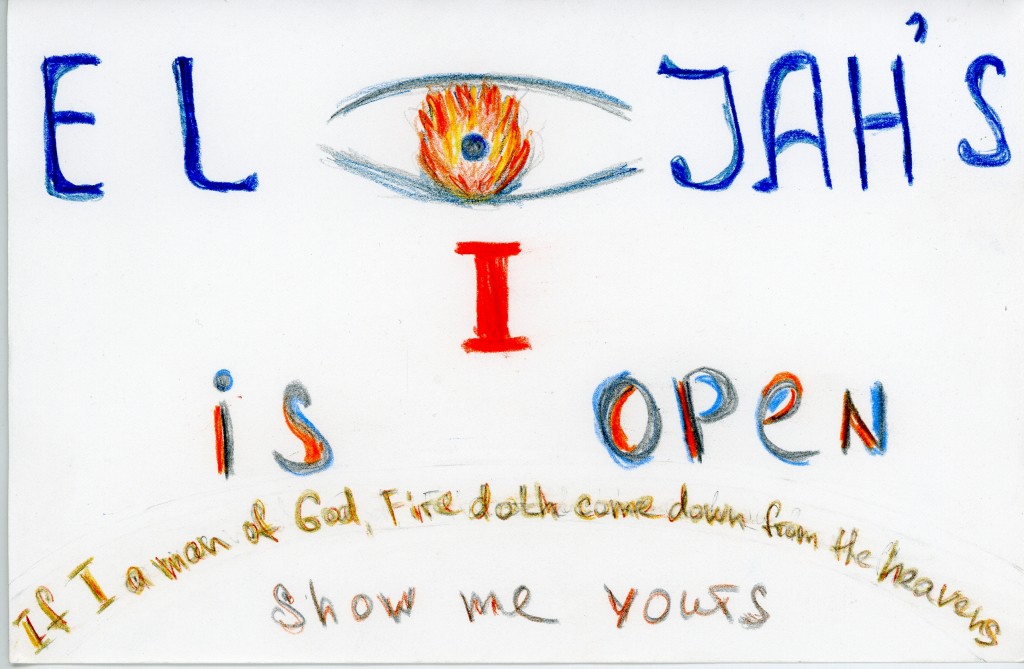There are verses in The Bible that are not easily understood face value. Here are a few of them that have to do with “eye” or “eyes”. What we will do is discuss these verses and demonstrate that the “eye” or “eyes” can mean either the inflated ego of man’s “I” or the Infinite “I AM” of God. The context of the verses will be very valuable to determine which “I” is in view. Is anything outside the power of God? God in His Infinite Wisdom has prepared this for our day today using the English language.
Therefore to be clear read the verses below and consider the following:
The words “eye” and “eyes” are not only physical eyes of a person. They are the identity of the “I” in the inflated ego or the “I AM” of God.
Genesis 3:7 “7 and the eyes of them both are opened, and they know that they are naked, and they sew fig-leaves, and make to themselves girdles.”
Genesis 6:8 “8 And Noah found grace in the eyes of Jehovah.”
Genesis 44:21 “21 ‘And thou sayest unto thy servants, Bring him down unto me, and I set mine eye upon him;”
Luke 11:34 “34 ‘The lamp of the body is the eye, when then thine eye may be simple, thy whole body also is lightened; and when it may be evil, thy body also is darkened;”
Proverbs 3:7 “7 Be not wise in thine own eyes, Fear Jehovah, and turn aside from evil.”
1 Corinthians 2:9 “9 but, according as it hath been written, ‘What eye did not see, and ear did not hear, and upon the heart of man came not up, what God did prepare for those loving Him—‘”
Matthew 19:24 “24 and again I say to you, it is easier for a camel through the eye of a needle to go, than for a rich man to enter into the reign of God.’”
The First Inflated Ego of Man’s I
To establish this principal we have to look at the fall of man first. This gives us the first look at what happened to Adam & Eve in The Garden of Eden. The serpent said “your eyes have been opened”:
Genesis 3:5 “5 for God doth know that in the day of your eating of it–your eyes have been opened, and ye have been as God, knowing good and evil.’”
Then we see below that the woman does see the tree with her sight and it is pleasant to her eyes:
Genesis 3:6 “6 And the woman seeth that the tree is good for food, and that it is pleasant to the eyes, and the tree is desirable to make one wise, and she taketh of its fruit and eateth, and giveth also to her husband with her, and he doth eat;”
Now we see their eyes are open however the verse before the woman was able to see the tree. This is not a matter of vision rather it is the opening of the “I” of the will of man to be separated from God.
Genesis 3:7 “7 and the eyes of them both are opened, and they know that they are naked, and they sew fig-leaves, and make to themselves girdles.”
Now we need to establish if this is truly a principal. This is easy when you consider the interaction God had with Adam and we read in verse 10 Adam’s first words to God.
Genesis 3:10 “10 and he saith, ‘Thy sound I have heard in the garden, and I am afraid, for I am naked, and I hide myself.’”
Adam in one sentence states his separation from God by saying “I” 4 times and 2 of those times saying “I AM”. This separation is evident as he is naked, afraid and hiding himself.
It is easy to see that now Adam & Eve knows “I” whereas before Adam & Eve was part of “WE” with God. Note just before Adam and Eve were evicted from The Garden of Eden God highlights the past relationship of “WE” in Genesis 3:22:
Genesis 3:22 “22 And Jehovah God saith, ‘Lo, the man was as one of Us, as to the knowledge of good and evil; and now, lest he send forth his hand, and have taken also of the tree of life, and eaten, and lived to the age,’ –”
When we read this verse in The Bible there is an image of a beam in someone’s eye that is that of the hypocrite. This does not make sense face value if we consider that this was a parable. What if this was more than a parable? What if this is a statement of fact that was reserved for our day? Let us consider that this verse in light of the phonetic word “I” instead of the visible word “eye”. How would this verse be seen in that light?
Matthew 7:3-5 Beam In Thine Eye
Before we can get to the eye of Matthew 7:3-5 we need to look at two preceding verses that establishes the manner of judgment we judge shall be the manner of judgment for us.
Matthew 7:1, 2 “1 ‘Judge not, that ye may not be judged, 2 for in what judgment ye judge, ye shall be judged, and in what measure ye measure, it shall be measured to you.”
When we read Matthew 7:3-5 we picture the image of a beam in the hypocrite’s eye. This does not make sense face value unless we consider that this was a parable highlighting who are you to judge when you have your own issues. What if this was more than the aforementioned parable? What if this is a statement of fact that was reserved for our day? Let us consider that this verse in light of the phonetic word “I” instead of the visible word “eye”. Also note since Adam & Eve everyone sees through the conscious of their own “I” (their eyes are opened). How would this verse be seen in that light?
Matthew 7:3-5 “3 ‘And why dost thou behold the mote that is in thy brother’s eye, and the beam that is in thine own eye dost not consider? 4 or, how wilt thou say to thy brother, Suffer I may cast out the mote from thine eye, and lo, the beam is in thine own eye? 5 Hypocrite, cast out first the beam out of thine own eye, and then thou shalt see clearly to cast out the mote out of thy brother’s eye.”
Now looking at the image below and reading the Matthew 7:3-5 a new understanding of the very nature of the eye (“I”) or inflated “I” is to judge the small eye (i) of his brother. Because this warning not to judge is given in the two verses before we know that the separation between God and man is manifested when someone judges based on the what they perceive through their eye “I”. We had seen the inflated ego and separation from God from Genesis 3 manifest here with the “beam in thine eye”. We see that heaven and earth is separated by the “I” of man’s will. The greater the “I” the greater the separation. We can see how the spec or mote can be the head of the lowercase “i”. The beam thereby being the center beam of the letter “I”. The parable understanding is not as strong as the “I” understanding. This is a clear verse without the need of a simile/parable of the eye.
One last thing to consider Jesus called them hypocrites because they are looking to help based on the distorted inflated ego of the “I” perception of God that is the opposite of the “reign of God”.
At this point one may ask themselves if there is any proof that the simile/parables might not be the full understanding in Truth? The answer to that is actually spoken of by Jesus in The Bible.
Mark 4:10-13 “10 And when he was alone, those about him, with the twelve, did ask him of the simile, 11 and he said to them, ‘To you it hath been given to know the secret of the reign of God, but to those who are without, in similes are all the things done; 12 that seeing they may see and not perceive, and hearing they may hear and not understand, lest they may turn, and the sins may be forgiven them.’ 13 And he saith to them, ‘Have ye not known this simile? and how shall ye know all the similes?”
Luke 8:9, 10 “9 And his disciples were questioning him, saying, ‘What may this simile be?’ 10 And he said, ‘To you it hath been given to know the secrets of the reign of God, and to the rest in similes; that seeing they may not see, and hearing they may not understand.”
Both verses above magnify the “reign of God” and to those “without” the word is a simile. The inflated “I” of man is separated from the “reign of God”. The “I” of man seeks to be above God.
Eye of The Needle
The verses dealing with the “eye of the needle” have been looked at for centuries and yet the clarity has been lacking. We can infer as a parable that it is impossible for the rich man to enter by his will. However that is not the same understanding as the “I” understanding we will explore now. Immediately in verse 23 it is evident that the “reign of the heavens” is “reign of God” which is the focus of verse 23 & 24. Therefore this is about the “reign of God” where there is no inflated ego of the “I” of man’s will. Reign of God means God is controlling and not man.
Matthew 19:23 “23 and Jesus said to his disciples, ‘Verily I say to you, that hardly shall a rich man enter into the reign of the heavens;”
Now we read the verse and look at “eye” as it being “I”. The image below will make this clearer. It is not that the camel has to go through the center of the opening of the needle that is called an eye. Rather it is giving us proportional size difference of the “i” of camel compared to the Inflated ego “I” of the rich man. It is easier for the “i” (camel) to be reigned over by God than the enormous inflated ego “I” of the rich man. The eye of the needle which is the “i” of the camel is representation of a simple man that can have God ringing over them. In the preceding verses the rich young ruler wanted to justify his own will and use have “life age-during” (we omitted those verses to keep this simpler).
Matthew 19:24 “24 and again I say to you, it is easier for a camel through the eye of a needle to go, than for a rich man to enter into the reign of God.’”

This is a YouTube about Eye of The Needle
Lamp of The Body
Below are two verses that state the “eye is the lamp of the body”. Again at face value this would be considered a simile or parable. The parable forces you to understand the eye in a capacity that doesn’t sense since the eye is a receptor of light not a giver of light. As we consider the “eye” as an “I” then these verses become a matter of fact and easily understood. The evil eye is an evil “I”
Matthew 6:22, 23 “22 ‘The lamp of the body is the eye, if, therefore, thine eye may be perfect, all thy body shall be enlightened, 23 but if thine eye may be evil, all thy body shall be dark; if, therefore, the light that is in thee is darkness–the darkness, how great!”
Luke 11:33-36 “33 ‘And no one having lighted a lamp, doth put it in a secret place, nor under the measure, but on the lamp-stand, that those coming in may behold the light. 34 ‘The lamp of the body is the eye, when then thine eye may be simple, thy whole body also is lightened; and when it may be evil, thy body also is darkened; 35 take heed, then, lest the light that is in thee be darkness; 36 if then thy whole body is lightened, not having any part darkened, the whole shall be lightened, as when the lamp by the brightness may give thee light.’”
Fear of God Before Their Eyes (I’s)
We can look at this verse below in the same manner since the physical eyes would not discern or be able to interpret a fear of God. Now looking at this verse with “I” we read “There is no fear of God before their I’s”. The verse takes on a perfect understanding as the will of man is always looking to glorify their “I” above God.
Ro 3:18 There is no fear of God before their eyes.’
No fear before their eyes is also magnified below in this passage that demonstrates the difference between the prayers of the Pharisee and that of the tax-gatherer.
Luke 18:9-14 “9 And he spake also unto certain who have been trusting in themselves that they were righteous, and have been despising the rest, this simile: 10 ‘Two men went up to the temple to pray, the one a Pharisee, and the other a tax-gatherer; 11 the Pharisee having stood by himself, thus prayed: God, I thank Thee that I am not as the rest of men, rapacious, unrighteous, adulterers, or even as this tax-gatherer; 12 I fast twice in the week, I give tithes of all things–as many as I possess. 13 ‘And the tax-gatherer, having stood afar off, would not even the eyes lift up to the heaven, but was smiting on his breast, saying, God be propitious to me–the sinner! 14 I say to you, this one went down declared righteous, to his house, rather than that one: for every one who is exalting himself shall be humbled, and he who is humbling himself shall be exalted.’”
You will find that the Pharisee lifted 5 “I’s” up to heaven.
You will find that the tax-gatherer “would not even the eyes lift up to the heaven”.
This comparison is very easily understood when you see the substance of their prayers.
The Pharisee is described by Jesus: “stood by himself” which before his prayers are spoken demonstrates his identification towards God (note the Pharisee was not aware of his “by himself” status). The Pharisee starts off his prayers with the word “I”. Then continues to thank God for that: “I am not as the rest of men” creating a comparison between himself and other people based upon keeping of the law and finally ending with the tax-gatherer. He goes on to glory upon his ability to keep the law in that adding two more “I’s” and then finally ending his prayer with “I posses” again exalting his own will.
Regarding the tax-gather we see a different prayer all together. The tax-gatherer was standing at a distance not to be seen by men. Note how the Pharisee was conscious of the tax-gatherer and judged the tax-gatherer with his “eyes” (I’s) however the tax-gatherer had nothing to say about the Pharisee (as if he didn’t exist). Further demonstrating that the relationship towards God is a personal matter and was not based upon comparison of other men (his eyes are in his head). The tax-gatherer “would not even the eyes lift up to the heaven” which demonstrates the fear of God in Romans 3:18. Instead of looking up to heaven with his eyes the tax-gatherer was hitting his own breasts with his hands. Literally putting judgment upon himself and goes on to say: “God be propitious to me–the sinner!”. The tax-gatherer knows his own sin and the other incredible unseen part of this last phrase is that he is asking God to be covering of the tax-gatherer’s sin. We know this to be true because Jesus said “this one went down declared righteous, to his house”. Therefore the tax-gatherer was conscious of his own sin and the glorious gift of salvation and he was with Jesus while the Pharisee had “stood by himself”.
Finally the last part of this verse:
“for every one who is exalting himself shall be humbled, and he who is humbling himself shall be exalted”
When man glorifies himself with the word “I” or “I AM” he is literally guilty of Romans 3:18 There is no fear of God before their eyes.’. Therefore those that have no fear of “I” will be humbled and those that fear “I” shall be exalted.
Wikipedia Controversey
On May 29th at 5:00 PM began to add 4 Wikipedia contributions based on this information above. That turned into a fiasco since the “process” of Wikipedia was more important than the content. The robot Wikipedia editors had deleted all of my contributions in a very unprofessional manner. Below is my contribution page to Wikipedia and if anyone reading this would like to contact the robots that blocked me please feel free to do so. We need to get this information in front as many eyes as possible and yes that means “I’s” as well.
https://en.wikipedia.org/wiki/Special:Contributions/Michaelidarecis
Robot first class: https://en.wikipedia.org/wiki/User_talk:Malik_Shabazz
Robot #2 a head robot: https://en.wikipedia.org/wiki/User_talk:Cullen328
Robot # 3: https://en.wikipedia.org/wiki/User_talk:Versageek



